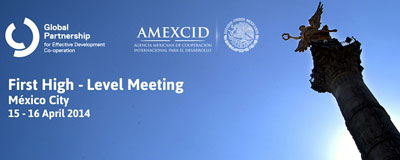The Southern Voice on Post-MDG International Development Goals in association with the Centre for Policy Dialogue (CPD), Dhaka and National Council of Applied Economic Research (NCAER), Delhi held a Focus Session titled ““Locating South-South Cooperation in Emerging Development Cooperation Architecture” on 15 April 2014 at the first High-Level Meeting (HLM) of the Global Partnership for Effective Development Cooperation (GPEDC) in Mexico.
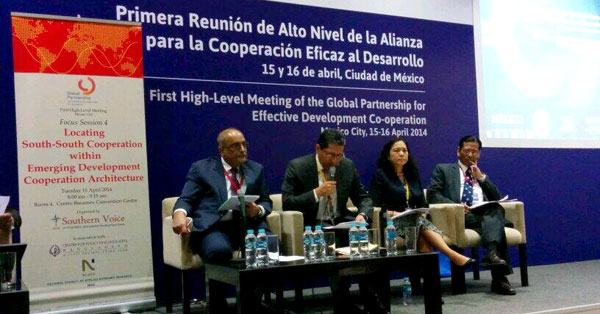
The focus session deliberated on core issues such as (i) How important is South-South cooperation in the evolving context of international development cooperation? (ii) Is it necessary and possible to develop a framework and a set of general principles as regards South-South Cooperation? and (iii) Can the OECD/DAC-centered development cooperation framework be improved upon by building on, learning from and leveraging South-South cooperation experiences?
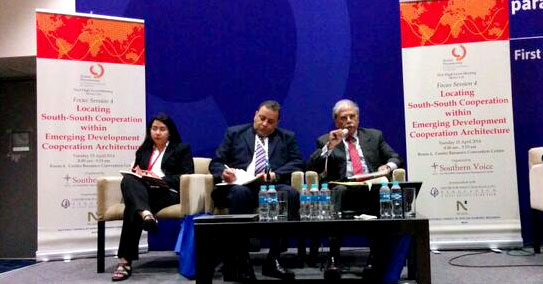
The delegates from CPD joining the Mexico HLM were Dr Debapriya Bhattacharya, Chair, Southern Voice on Post-MDGs and Distinguished Fellow, CPD; Professor Mustafizur Rahman, Executive Director, CPD and Dr Fahmida Khatun, Research Director, CPD.
The focus session was also addressed by H E Jaime Miranda, Foreign Minister of El Salvador; Ambassador Omar Abou Eich, Deputy Assistant Foreign Minister for International Cooperation for Development of Egypt; Ms Mariam Mahamat Nour, Minister of Economy, Planning and International Cooperation of Chad; Ms Tomoko Nishimoto, Director on South-South Cooperation, UNEP and Dr Shekhar Shah, Director-General, NCAER, New Delhi.
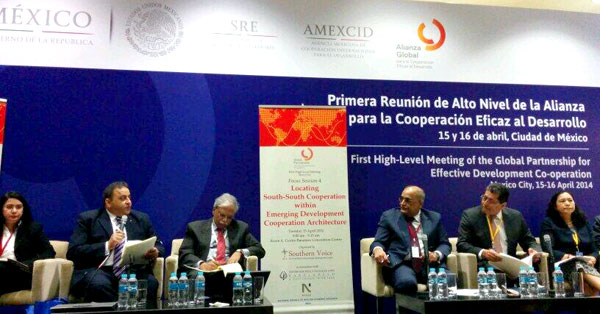
Earlier Southern Voice on Post-MDGs along with CPD and NCAER organised a regional outreach in New Delhi on 27-28 March 2014 to generate a South Asian perspective on South-South cooperation. The outcome of this event was also disseminated in the Mexico Ministerial.
Southern Voice on Post-MDGs is a network of 49 think tanks from South Asia, Latin America and Africa with its secretariat at CPD, Dhaka. For details see http://southernvoice-postmdg.org/.
[/tab] [tab title=”Agenda”]FOCUS SESSION 4: Locating South-South Cooperation within Emerging Development Cooperation Architecture
Date: 15 April, 2014
Time: 8:00 – 9:15 am
Venue: Room no. 4
Centro Banamex Convention Centre
Avenida Conscripto 211
Lomas de Sotelo, Miguel Hidalgo
Mexico City
Background
South-South cooperation (SSC) is increasingly gaining momentum. The focus on SSC received renewed attention since the fourth High-level Forum on Aid Effectiveness held in Busan in 2011. The focus session has been proposed to provide conceptual clarity and practical insights about SSC for the GPDEC in Mexico. The core objective of the proposed focus session is to seek ways and means to integrate the South-South cooperation resultatively in the global partnership of effective development cooperation (GPEDC). while South-South Cooperation is being thought as one of the important elements of the emerging global development cooperation architecture, there is a definite need to take a closer and rigorous look at this evolving phenomenon from multi-stakeholders’ perspectives. The session has been developed from that vantage point.
Southern Voice on Post-MDG International development Goals in collaboration with the National Council of Applied Economic Research (NCAER), New Delhi and Centre for Policy Dialogue (CPD), Dhaka held a dialogue titled “Deconstructing South-South Cooperation: A South Asian Perspective” on 28th March, 2014 in New Delhi, India. The outcome document of the New Delhi Meeting will be disseminated by Southern Voice during the GPEDC Mexico Ministerial in April 2014.
Objective
The specific objectives of the panel will be the following:
- Bring about further conceptual clarity by demystifying SSC in terms of its context, objectives, scope and policy framework and consider whether this adds up to a set of general principles for SSC that can have wider utility
- Explore the practicalities of SSC by assessing their modalities and instruments and their effectiveness; what value would the general principles under (i) have for assessing these practicalities?
- Revisit specific experiences of SSC through empirical evidence and case studies; consider how existing cooperation frameworks, such as DAC, support, learn from, and build on these experiences.
Session Format
The duration of the session will be 1 hour and 15 minutes. It will take place in a panel discussion format with provision for floor discussion. Three-five eminent panelists representing different constituencies will make short opening statements on different aspects of the theme. The moderator (chair) of the session will then instigate and manage an inter-active exchange between the panelists and other participants. The session will be rounded off with a set of closing statements from the panelists and a brief summary of the key messages from the moderator.
Core Issues for Discussion
- How important is South-South cooperation in the evolving context of international development cooperation?
- Is it necessary and possible to develop a framework and a set of general principles as regards South-South Cooperation?
- Can we improve upon the DAC-centered development cooperation framework by building on, learning from and leveraging South-South cooperation experiences?
Chair/Speakers/Panelists
Chair:
Ambassador Dr. Debapriya Bhattacharya, Chair, Southern voice on Post-MDG International Development Goals and Distinguished Fellow, Centre for Policy Dialogue (CPD), Bangladesh
Presentation of Resource Document and Delhi Outcome: Dr. Fahmida Khatun, Research Director, Centre for Policy Dialogue (CPD), Bangladesh
Panelists:
- H.E. Jaime Miranda, Minister of Foreign Affairs, El Salvador
- H.E. Mariam Mahamat Nour, Minister of Economy, Planning and International Cooperation, Chad
- H.E. Omar Abou Eich, Deputy Assistant Foreign Minister, Ministry of Foreign Affairs, Egypt
- Prof. Mustafizur Rahman, Executive Director, Centre for Policy Dialogue (CPD), Dhaka
- Dr. Shekhar Shah, Director-General, the National Council of Applied Economic Research (NCAER), Delhi
- Ms. Tomoko Nishimoto, Director for South-South Cooperation, UNEP
Related Links
http://southernvoice-postmdg.org/th_event/session-on-locating-south-south-cooperation-within-emerging-development-cooperation-architecture/
http://southernvoice-postmdg.org/th_event/deconstructing-south-south-cooperation-a-south-asian-perspective/
Organisers
Southern Voice on Post-MDG International Development Goals
Centre for Policy Dialogue (CPD), Dhaka
The National Council of Applied Economic Research (NCAER), India
Contact
Dr. Debapriya Bhattacharya
e-mail:debapriya.bh@gmail.com
Telephone Number: +88029134438
Ms Afnan Ashfaque
e-mail: afnan.cpd@gmail.com
Mobile Number: +8801747174440
Download the Outcome Paper
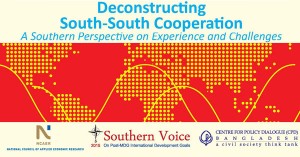
DECONSTRUCTING SOUTH-SOUTH COOPERATION
A SOUTH ASIAN PERSPECTIVE
Amaltas Hall, India Habitat Centre, New Delhi
28 March 2014
initiated by
Southern Voice Initiative
organised by
National Council of Applied Economic Research (NCAER), New Delhi
in association with
Centre for Policy Dialogue (CPD), Dhaka
South-South cooperation has been receiving increasing attention in recent times in the backdrop of the emergence of Southern economies as strong drivers of global growth. Notwithstanding the fact that countries of the global South have been pursuing cooperation at various levels and degrees for several decades, there is now a growing realisation about the need for deepening their interdependencies. Increased intra-South connectedness involving developing countries has not only created new avenues of collaboration for developing countries, they are also being confronted with new challenges in pursuing this cooperation. Whether South-South cooperation will be an alternative or a complement to the traditional North-South cooperation and relationship, is an issue which is being hotly debated as traditional development actors are being challenged by the increasing role of South-South cooperation. By deconstructing various dimensions and potential opportunities of South-South cooperation, the paper sheds useful light on the prospects and challenges of this emerging phenomenon that is commanding increasing interest from the perspective of both developmental theory and praxis.
[/tab] [tab title=”First HLM”] [/tab] [/tabs]


